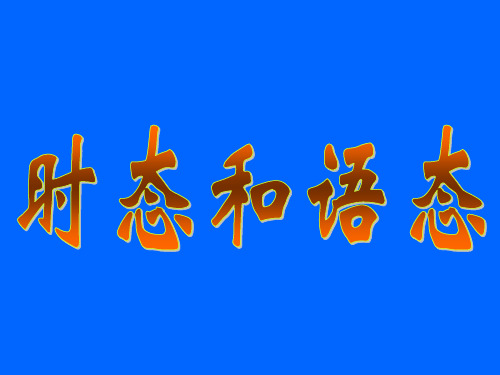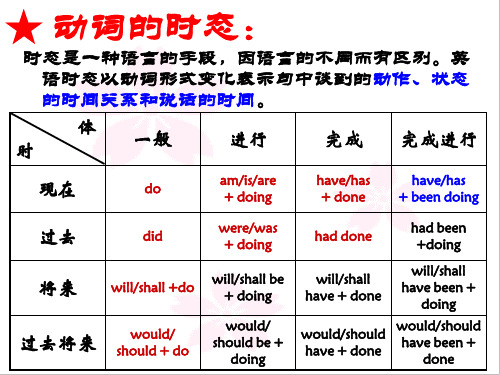动词时态与语态PPT
合集下载
语法复习-谓语动词的时态+语态(共83张PPT)

现在 过去 将来
一般
进行时
完成时
一般现在时: 现在进行时:
原形(do)
am/is/are doing
第三人称单数形
式(does)
现在完成时: have / has done
一般过去时:
一般过去式 (did)
过去进行时: 过去完成时: was / were doing had done
一般将来时:
1)will do
drop, fit, nod, dig, forget, regret, rid】 • 4)以 y 结尾的动词,直接加 ing • 5)以ie结尾的动词,把ie改为y ,再加ing
动词的ing形式
• run_____ • swim____ • sit ____
• stop_____ • have_____ • dance_____ • organize____
②③不适合语法填空中填 动词的适当形式。
一般将来时的用法
1. He will graduate from Harvard University next year.
2. I am going to buy a new laptop this winter. 3. The car is going to turn over. 5. I am to take over the job. 6. The conference is about to begin.
过去 将来
现在
将来
现在 过去 将来
一般
进行时
完成时
一般现在时: 现在进行时:
原形(do)
am/is/are doing
第三人称单数形
式(does)
【高三一轮复习语法】动词的时态与语态(共28张ppt)

②在条件状语从句和时间状语从句中用一般现在时表将来(主将从现)。 If you leave tomorrow , I'll see you at the airport. 如果你明天走,我到机场送你。 When she comes, I'll tell her about it. 她来时我将把这件事告诉她。 (2)现在进行时表将来 现在进行时表示将来,往往是指计划好或准备要做的事。一些表示动作 转换的动词,如go, come, leave, start, begin,stay,take off,arrive等,或 者也称为位移性动词,其进行时表示马上要做某事。
• He used to get up early . 过去他总是早起。(现在不这样了) • He will be used to getting up early . 他将会习惯早起。 • Wood is used to make paper. 木材被用来造纸。
(三)一般将来时
1、表示将要发生的动作或存在的状态,常用的时间状语有later(on), soon, in a month, next time, from now on, tomorrow等。 I shall be eighteen years old next year. 明年我就十八岁了。 2、一般将来时的其它表示形式 (1)一般现在时表将来 ①按照计划或时刻表要发生的事情。 The new library opens next month. 新图书馆下月开放。 The plane takes off at 3:00 P.m. 飞机于下午三点起飞。
We are about to discuss this problem.我们将马上讨论这个问题。 They were about to leave when the telephone rang. 他们正要离开时电 话响了。
高中英语语法时态和语态课件(共69张PPT)

不能用 be+v-ing, be+v-ing表示将来,主要强调已经 作出的 安排,e.g. i’m pic you up at 6:00,don’t forget. ) ②强调某个意图是事先考虑好的:
--ann is in hospital.
--yes, i know. i’m going to visit her tomorrow.
--oh,really? i didn’t know. i’ll go and visit her. 2〕表示迹象表明要发生某事,则只能用be going to,e.g.
look at the dark clouds.it’s going to rain. 3〕be going to还有以下用法,e.g. ①强调主观想法或意图: i’m going to wash the car if i have time. (注意:此时
②It was then a small fishing village.
2.特别用法:
1〕表客气或委婉的现在:
①I wondered if you were free this evening.
②I thought you might like some flowers.
(注:过去进行时也可表示现在使语气更委婉、客气,eg.① I was wondering if you could give me a lift. ②We were hoping you would stay with us.能这样用的动 词主要限于want, wonder , think, hope, intend等少数 动词。)
②Someone has broken the window.(结果: 窗户仍破 着)
2〕持续性用法:该用法表示一个过去发生的动作在过去 并未在过去完成,而是持续到现在,且可能继续持续下去 或可能到此结束,e.g.
--ann is in hospital.
--yes, i know. i’m going to visit her tomorrow.
--oh,really? i didn’t know. i’ll go and visit her. 2〕表示迹象表明要发生某事,则只能用be going to,e.g.
look at the dark clouds.it’s going to rain. 3〕be going to还有以下用法,e.g. ①强调主观想法或意图: i’m going to wash the car if i have time. (注意:此时
②It was then a small fishing village.
2.特别用法:
1〕表客气或委婉的现在:
①I wondered if you were free this evening.
②I thought you might like some flowers.
(注:过去进行时也可表示现在使语气更委婉、客气,eg.① I was wondering if you could give me a lift. ②We were hoping you would stay with us.能这样用的动 词主要限于want, wonder , think, hope, intend等少数 动词。)
②Someone has broken the window.(结果: 窗户仍破 着)
2〕持续性用法:该用法表示一个过去发生的动作在过去 并未在过去完成,而是持续到现在,且可能继续持续下去 或可能到此结束,e.g.
【高考】语法动词的态与语态ppt课件

He looks upset. Do you know why? 他看起来很沮丧。你知道原因吗?
2. 表示客观存在及普遍真理。
综合演练
3. 表示现在经常和习惯性发生的动作,常与 sometimes, often, usually, always, every...等时间状语连用。 4. 一般现在时表将来的动作 (1)在由 when, after, before, as, as soon as, although, if, even if, in case, till, until, unless, as long as, where, whatever, wherever 等引导的时间、条件或让 步状语从句中常用一般现在时表将来。
I haven't eaten anything since breakfast. 我从早餐后到现在一直没有吃东西。
综合演练
3. 现在完成时用于固定句型中 (1)It/This/That is+the first/second/...time that+现在完成时. (2)This/That/It is the+形容词最高级+名词(+that)+现在完成时.
He has died for two years.(错误) He has been dead for two years.(正确)
综合演练
(2)现在完成时与一般过去时的区别 现在完成时强调过去的动作对现在的影响和结果;一般过去时只是对过去 动作的叙述,与现在没有关系。
He hasn't turned off the light yet. 他还没有关灯。(灯还亮着)
I have been calling him many times this morning, but there's no answer. 今天早晨我给他打了很多电话,但是没人接。
专题10 动词的时态和语态(课件)-2024年中考英语复习(全国通用)

14.(2022·湖北武汉·统考中考真题)—I don’t think sixteen-year-olds should be allowed
to drive. —I ________. It’s not safe. A.agree B.agreed C.will agree
D.had agreed
apples in the fridge now.
A.is
B.are
C.was
D.were
【答案】A 【解析】句意:现在冰箱里有一些果汁和几个苹果。考查一般现在时及 “there be”。根据“now”,排除过去时态的CD,由于there be的就近原则, some juice不可数,所以应是is。故选A。
5.(2023·甘肃白银·校考一模)Thanks to those cleaners who ________ hard on the streets, we can have a beautiful city. A.work B.worked C.have worked D.were working
真理。
时态的辨析 满分秘籍
易失分点
提分特训
时态 谓语动词
意义
例句
一般
表示过去
过去 was/were,did 的动作或
时
状态。
When he was a child, he often swam in the river.当他小的时候,他经常在河里游泳。
16.(2023·江苏南通·统考一模)—What will the weather be like tomorrow? —I was on the phone and ________ most of the weather report. A.have missed B.was missing C.will miss D.missed
动词的时态与语态共67张PPT

was/were going to do 或 would do
the next day等
专题9 动词的时态与语态3
时态 现在进行时 过去进行时
现在完成时
过去完成时
结构 am/is/are doing was/were doing
has/have done
had done
常连用的时间状语
now, these days等 at this time yesterday, at that time, when引导的时间 状语从句等 already, yet, ever, never, so far, for three days, since two days ago等 before, when引导的时 间状语从句, by+过 去时间
结构 am/is/are+过去分词
was/were+过去分词 will be或is/are going to be+过去分词 has/have been + 过去分词
情态动词+be+ 过去分词
示例
All these things are made by machines.
This book was written by Lu Xun.
专题9 动词的时态与语6态
4.在现在完成时的句子中,如果有持续的时间状语,要把非延续性动词变为 延续性动词。如: I have had the book for two days. 这本书我已经买了两天了。(用had,而不用bought) How long may I keep the book? 这本书我可以借多长时间?(用keep,而不用borrow)
The meeting took place in a beautiful city. 会议在一座美丽的城市举行。 A fire broke out during the night.
动词的时态和语态-PPT课件

8. The man _h_a_d__h_o_p_e_d__ (hope) to catch the last train, but he was too late.
9. The boys __w_e_r_e_p_l_a_y_in_g___ (play) basketball from 5:00 to 6:00 yesterday.Βιβλιοθήκη .19练习
.
20
用所给动词的正确形式填空: 1. She _l_e_ft__ (leave) the office two
hours ago. 2. As son as she arrived home, the girl
discovered that she _h_a_d__t_a_k_e_n__ (take) her friends book by mistake. 3. Who _c_o_m__e_s__ (come) to school earliest in your class every morning? 4. Great changes _h_a_v_e_t_a_k_e_n_p__la_c_e__ (take place) in this city since 1979. 5. By the time he was twelve, Edison _h_a_d__b_e_g_u_n_ (begin.) to sell newspape21rs.
I’ll go to see you when I have time. I’ll go to see you if I have time tomorrow. 2. 某些动词,如:stand, continue, wish, love, like, hate, feel, find, think等常用一般现在时态
9. The boys __w_e_r_e_p_l_a_y_in_g___ (play) basketball from 5:00 to 6:00 yesterday.Βιβλιοθήκη .19练习
.
20
用所给动词的正确形式填空: 1. She _l_e_ft__ (leave) the office two
hours ago. 2. As son as she arrived home, the girl
discovered that she _h_a_d__t_a_k_e_n__ (take) her friends book by mistake. 3. Who _c_o_m__e_s__ (come) to school earliest in your class every morning? 4. Great changes _h_a_v_e_t_a_k_e_n_p__la_c_e__ (take place) in this city since 1979. 5. By the time he was twelve, Edison _h_a_d__b_e_g_u_n_ (begin.) to sell newspape21rs.
I’ll go to see you when I have time. I’ll go to see you if I have time tomorrow. 2. 某些动词,如:stand, continue, wish, love, like, hate, feel, find, think等常用一般现在时态
动词时态语态ppt课件

4) 用在一些句型里:
It is time you went to bed. I wish I were a bird. I'd rather you came tomorrow.
寒假来临,不少的高中毕业生和大学 在校生 都选择 去打工 。准备 过一个 充实而 有意义 的寒假 。但是 ,目前 社会上 寒假招 工的陷 阱很多
(客观安排) I’m going to play football tomorrow afternoon.
(主观安排)
■
现在进行时 寒假来临,不少的高中毕业生和大学在校生都选择去打工。准备过一个充实而有意义的寒假。但是,目前社会上寒假招工的陷阱很多
▲ 现在进行时的基本用法: a. 表示现阶段或目前正进行的动作。 We are waiting for you. Mr. Green is writing another novel this month.
doing
had done
had been +doing
will/shall have + done
will/shall have been +
doing
would/should have + done
would/should have been +
done
一般现在时的用法 寒假来临,不少的高中毕业生和大学在校生都选择去打工。准备过一个充实而有意义的寒假。但是,目前社会上寒假招工的陷阱很多 • 表示经常性或习惯性的动作或存在的状态,常
与表示频度的时间状语连用。 every…, sometimes, often, usually, on Sunday
I leave home for school at 7 every morning. He is alone.
It is time you went to bed. I wish I were a bird. I'd rather you came tomorrow.
寒假来临,不少的高中毕业生和大学 在校生 都选择 去打工 。准备 过一个 充实而 有意义 的寒假 。但是 ,目前 社会上 寒假招 工的陷 阱很多
(客观安排) I’m going to play football tomorrow afternoon.
(主观安排)
■
现在进行时 寒假来临,不少的高中毕业生和大学在校生都选择去打工。准备过一个充实而有意义的寒假。但是,目前社会上寒假招工的陷阱很多
▲ 现在进行时的基本用法: a. 表示现阶段或目前正进行的动作。 We are waiting for you. Mr. Green is writing another novel this month.
doing
had done
had been +doing
will/shall have + done
will/shall have been +
doing
would/should have + done
would/should have been +
done
一般现在时的用法 寒假来临,不少的高中毕业生和大学在校生都选择去打工。准备过一个充实而有意义的寒假。但是,目前社会上寒假招工的陷阱很多 • 表示经常性或习惯性的动作或存在的状态,常
与表示频度的时间状语连用。 every…, sometimes, often, usually, on Sunday
I leave home for school at 7 every morning. He is alone.
中考英语(人教版)动词的时态和语态 (共114张PPT)

考点二 一般过去时 1.概念、句式结构及常用的时间状语 (1)概念:一般过去时表示过去某个时间所发生的动作 或存在的状态。
(2)句式结构(肯定句)有以下四种:
句式结构
例句
was/were+表语 She was a beautiful girl ten years ago. Her father was on business.
句式结构
例句
am/is/are+表语
She is a beautiful girl. Her father is always on business.
there is/are
There is a schoolbag on the desk. There are five people in my family.
(3)常用的时间状语有:yesterday(昨天), the day before yesterday(前天), last week(上星期), last month(上个月), last year(去年), two days ago(两天前), three years ago(三年 前), in 2001(在 2001 年), just now(刚才)等。
(3)描述客观真理、客观存在或科学事实等。 The light travels faster than the sound. 光比声音传播得快。 The sun rises in the east.太阳从东方升起。
注意 在宾语从句中,即使主句是一般过去时,但 从句表示客观真理、客观存在或科学事实时,从句依然用 一般现在时。
(根据汉语意思完成句子。) 如果我找到他的电话号码,我会告诉你。 If I find his phone number, I will tell you.
- 1、下载文档前请自行甄别文档内容的完整性,平台不提供额外的编辑、内容补充、找答案等附加服务。
- 2、"仅部分预览"的文档,不可在线预览部分如存在完整性等问题,可反馈申请退款(可完整预览的文档不适用该条件!)。
- 3、如文档侵犯您的权益,请联系客服反馈,我们会尽快为您处理(人工客服工作时间:9:00-18:30)。
have (got)
实义动词作 谓语
I have (got) two toys. She has (got) many friends. He gets up at six o'clock every day. She likes eating chocolate every night.
(3)常用的时间状语有:always(总是;一直), often(经 常), sometimes(有时), seldom(很少), hardly ever(几乎不), never(从不), every day(每天), every week(每星期), every month(每月), every year(每年)等。
注意
若表示经过一定的计划安排之后打算做某事,
要用 be going to,而不能用 will。 My brother is going to learn English next year. 我哥哥准备明年学习英语。
(2)be going to 表示根据主观判断将来肯定要发生的事 情, will 表示客观上将来势必发生的事情。主语可以是人 也可以是物。 Look at the dark clouds!It's going to rain. 看那乌云!看来马上要下雨了。 My head hurts badly. I'm afraid I'm going to have a bad cold. 我头疼得厉害,恐怕要得重感冒了。 He will be twenty years old next year. 明年他就要 20 岁了。
(2)表示过去经常发生的动作或存在的状态。 He went to the hospital once a week last year. 去年他每周去医院一次。 She often went to school by bike when she studied there. 她在那里学习的时候,经常骑自行车去上学。
(3)用于虚拟语气句中,表示与现在事实相反的情况。 If I were you, I would take a small present. 如果我是你的话,我就会带上一件小礼物。 If I won a million dollars, I'd give it to charities. 要是我赢了一百万美元,我要把它捐给慈善机构。 注意 能改为 was。 在虚拟条件句“If I were you...”中, were 不
2.My brother works in a radio factory. 否定句:__________________________________________ 一般疑问句:________________________________________ 对划线部分提问:________________________________1.概念、句式结构及常用的时间状语 (1)概念:一般过去时表示过去某个时间所发生的动作 或存在的状态。
(2)句式结构(肯定句)有以下四种:
句式结构 was/were+ 表语 there was/were had(got) 例 句 She was a beautiful girl ten years ago. Her father was on business. There was a schoolbag on the desk. There were five people in my family.
动词的时态和语态
一、动词的时态
考点一
一般现在时
1.概念、句式结构以及常用的时间状语 (1)概念:一般现在时表示主语经常性和习惯性发生的 动作或存在的状态。
(2)句式结构(肯定句)有以下四种:(对应一般现在时)
句式结构 am/is/are+ 表语 there is/are 例 句 She is a beautiful girl. Her father is always on business. There is a schoolbag on the desk. There are five people in my family.
(2)描述现在的状态、能力、性格等。 She is very tired now. 她现在很累。 He speaks Russian very well. 他俄语讲得非常好。
(3)描述客观真理、客观存在或科学事实等。 The light travels faster than the sound. 光比声音传播得快。 The sun rises in the east.太阳从东方升起。 注意 在宾语从句中,即使主句是一般过去时,但
Diana, together with her friends, Chinese in China. A. study C. studies 答案: C B. have studied D. are studying
3.一般现在时的用法小结 (1)表示经常性或习惯性发生的动作或存在的状态,常 与表频度的时间状语连用。 My mother often does housework. 我妈妈经常做家务。 My father goes to work every day. 我爸爸每天都去上班。
2.第三人称单数的构成方式 当主语是第三人称单数时,谓语动词要用第三人称单 数形式,其变化规则同名词变复数。 (1)直接在词尾加s。 swim→swims, work→works, travel→travels,play→ plays, leave→leaves
(2)以字母 s,x,ch,sh,o 结尾的,在词尾加es。 pass → passes, fix → fixes, teach → teaches , wash → washes, go→goes, do→does (3)以“辅音字母+y”结尾的,变 y 为 i 加es。 study→studies, fly→flies, cry→cries, carry→carries
I had (got) two toys. She had (got) many friends. 实义动词作 He got up at six o'clock yesterday. She ate chocolate last night. 谓语
(3)常用的时间状语有: yesterday(昨天), the day before yesterday(前天 ), last week( 上星期 ), last month(上个月 ), last year(去年), two days ago(两天前), three years ago(三 年前), in 2001(在 2001 年), just now(刚才)等。
考点三
一般将来时
1.概念、句式结构以及常用的时间状语 (1)概念:一般将来时表示将要发生的动作或存在的状 态。
(2)句式结构(肯定句)有以下三种:
句式结构 will/shall+动词原形 例 句 They will have a good time. We are going to take an be going to+动词原形 exam. be doing(进行时态表示将来) The bus is coming.
从句表示客观真理、客观存在或科学事实时,从句依然用 一般现在时。
The teacher told us that the earth is round yesterday. 昨天老师告诉我们地球是圆的。 (4)在时间、 条件状语从句中, 用一般现在时表示将来。 I want to be a policeman when I grow up in the future. 我将来长大了要当一名警察。 I'll ring you up if he comes back tomorrow. 如果他明天回来,我会给你打电话。
句型转换 1. The children had a good time in the park. 否定句:__________________________________________ 一般疑问句:________________________________________ 对划线部分提问:____________________________________
— Excuse me, look at the sign NO PHOTOS! —Sorry, I ________ it. A.don't see C.haven't seen 答案:B B.didn't see D.won't see
用括号中所给词的适当形式填空 1.My daughter___ (watch) TV every day. Sometimes she ___ __ (see) a film on Sunday. 2.Tom and Mary ___________ (come) to China last month. 3. Mike _________________(not go) to bed until 12 o’clock last night. 4.Li Wei__ (have) a daughter. She___(stay)in a nursery(托儿所). 5.Her mother ______ (teach) English at a middle school. 6.He ___ (say) that Prof. Li ___ (be) tired. 7. I listened but ___________ (hear) nothing.
2.一般将来时的用法小结 (1)be going to 和 will 表示将要发生的动作或存在的状 态,主语一般为人。 We're going to have a meeting to discuss the plan. 我们打算开会讨论这个计划。 She will reach here at five o'clock this afternoon by car. 今天下午五点她将乘车到达这里。
